unit 3 back to the past grammar
文档属性
| 名称 | unit 3 back to the past grammar |
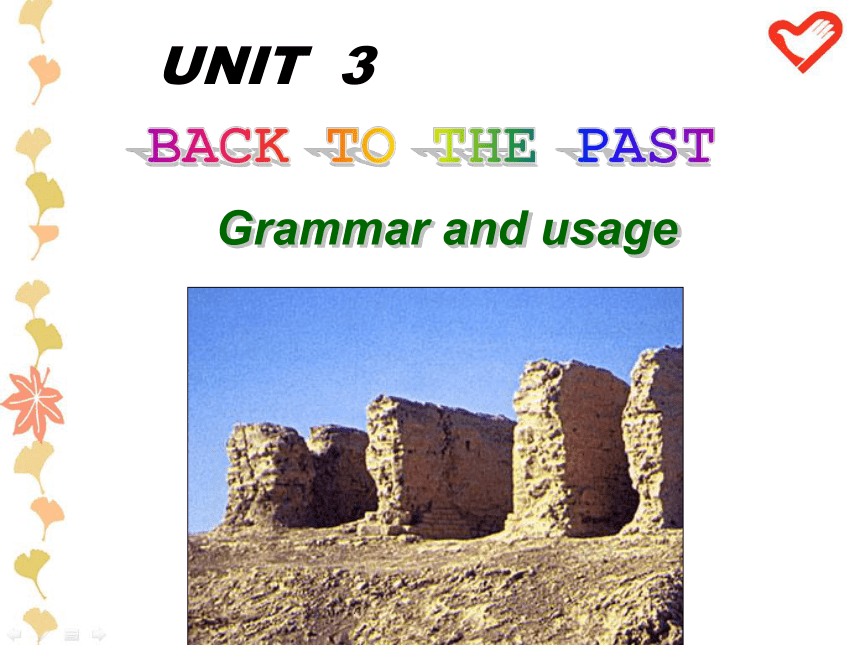
|
|
| 格式 | rar | ||
| 文件大小 | 337.6KB | ||
| 资源类型 | 教案 | ||
| 版本资源 | 牛津译林版 | ||
| 科目 | 英语 | ||
| 更新时间 | 2009-03-11 00:00:00 | ||
图片预览

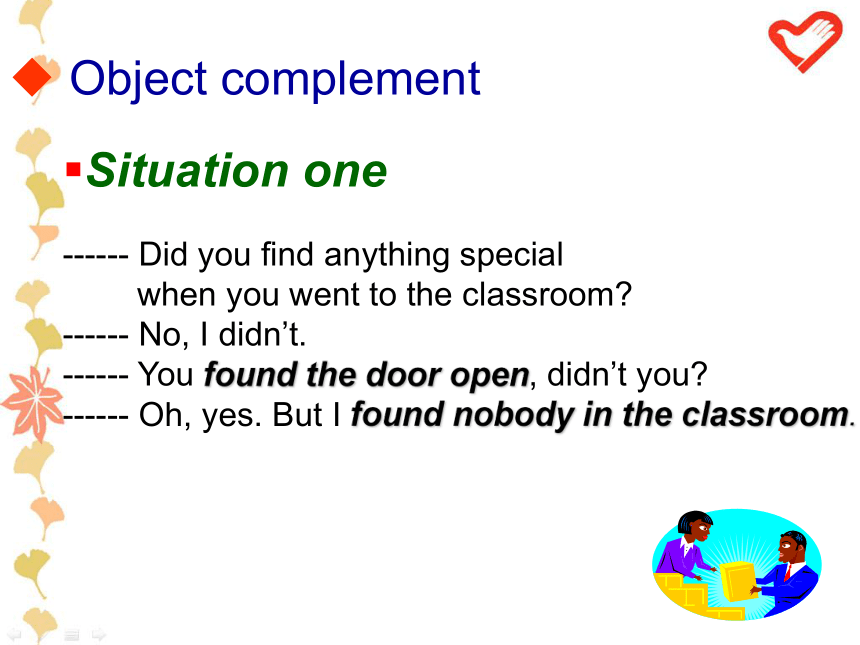
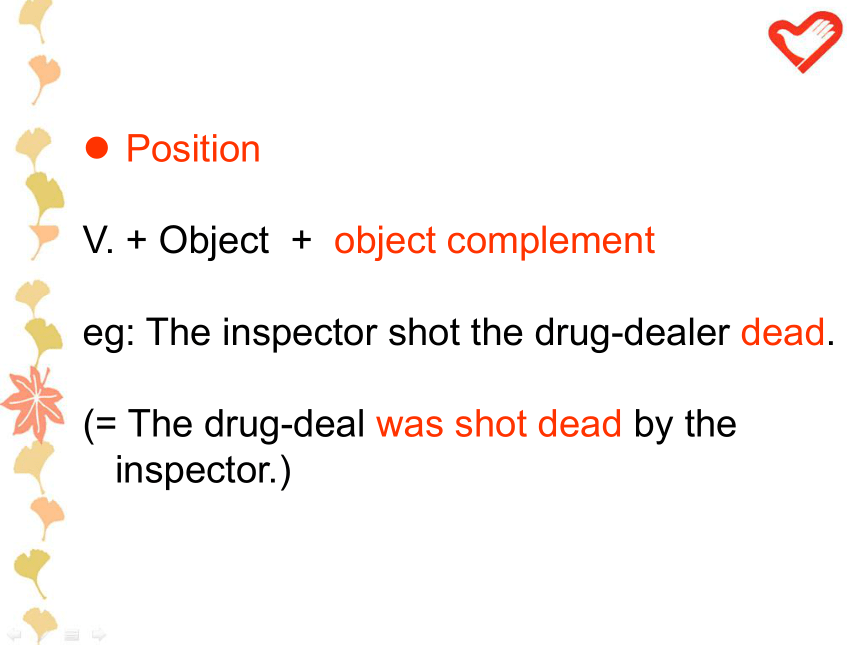
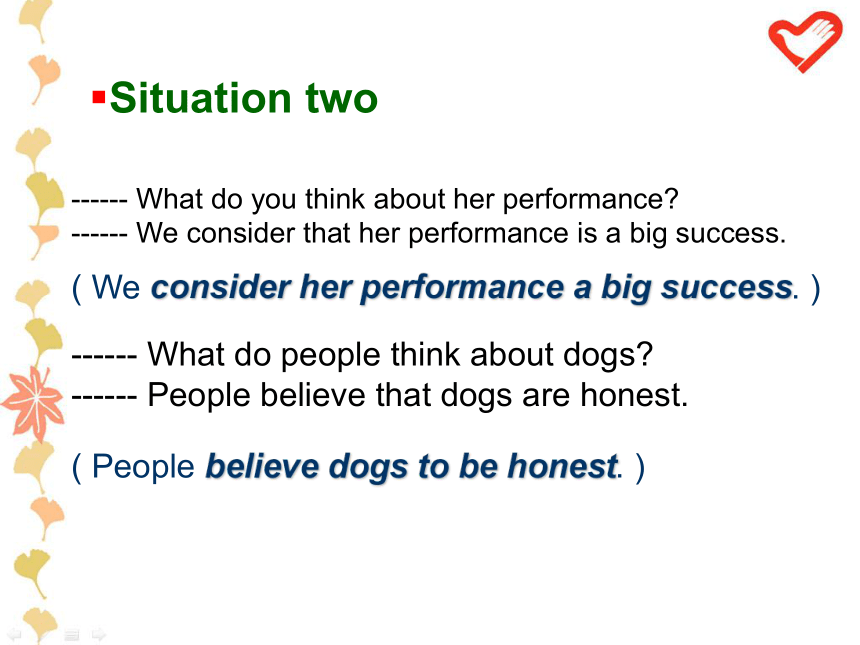
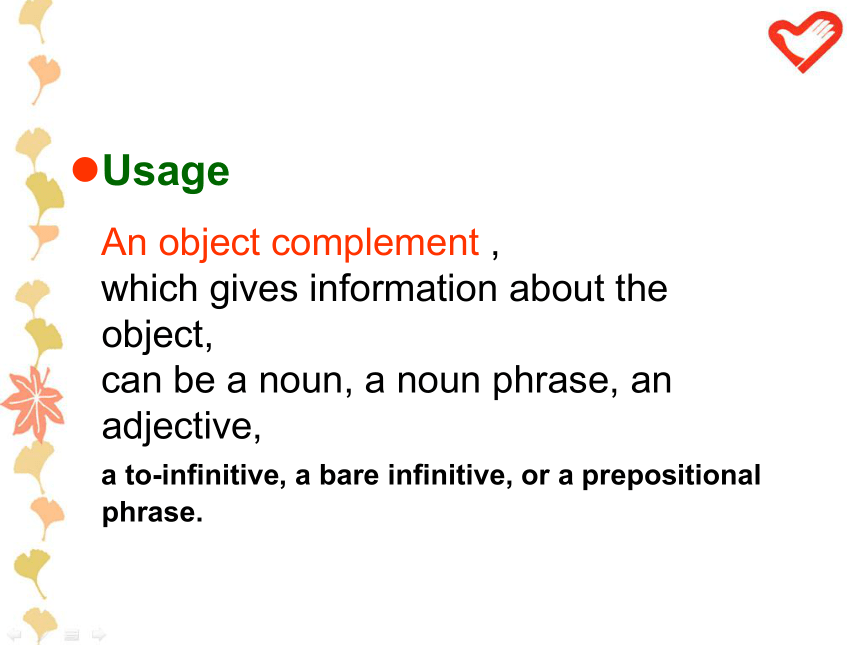
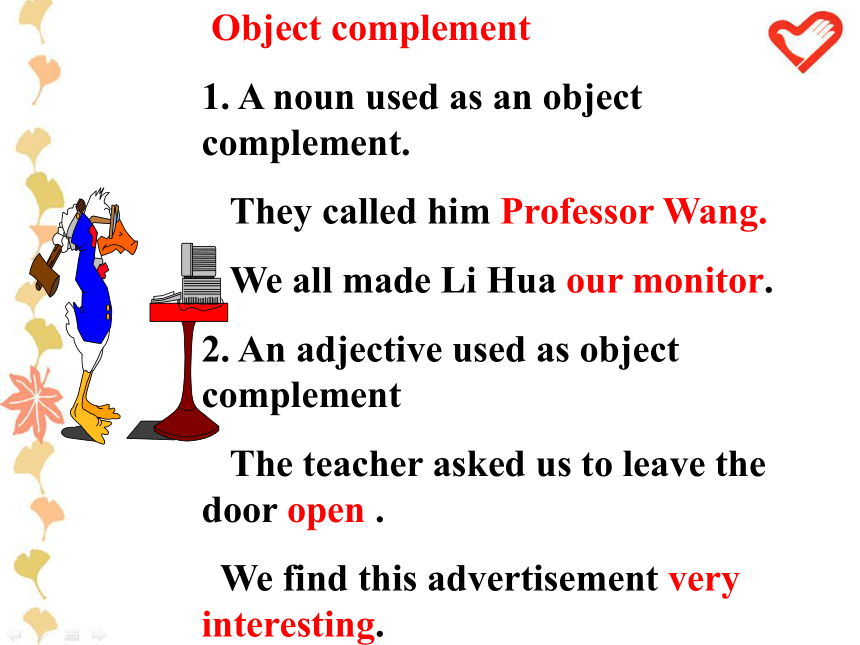
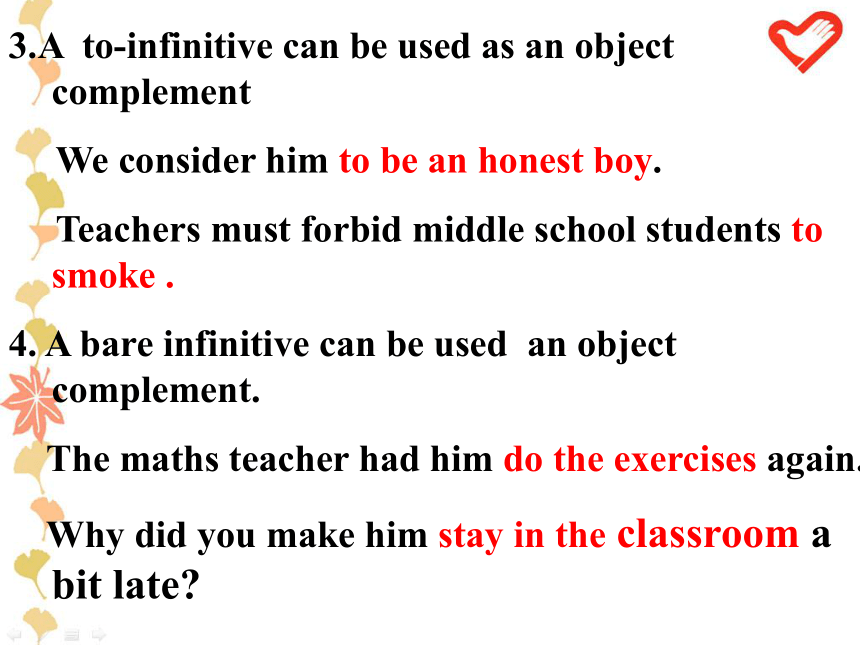
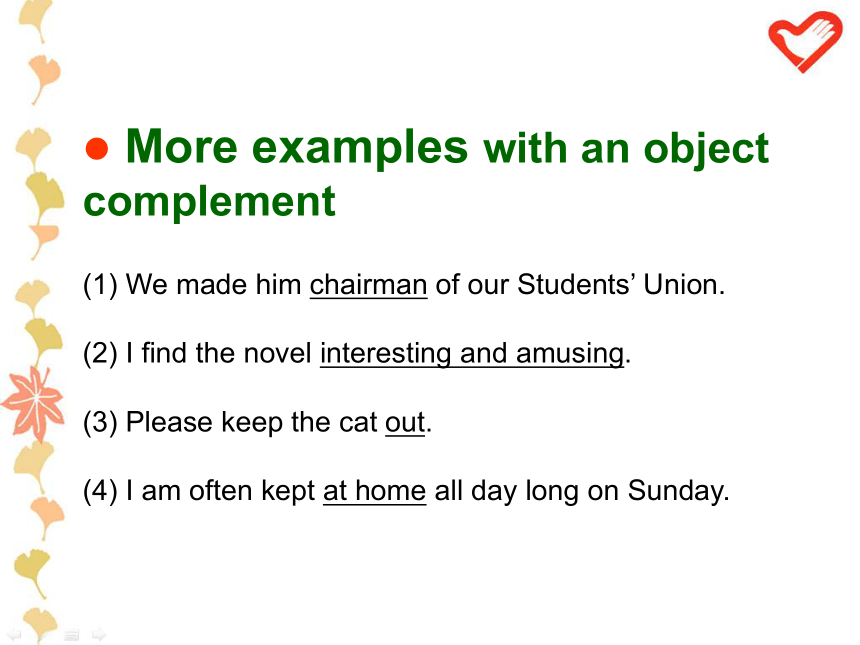
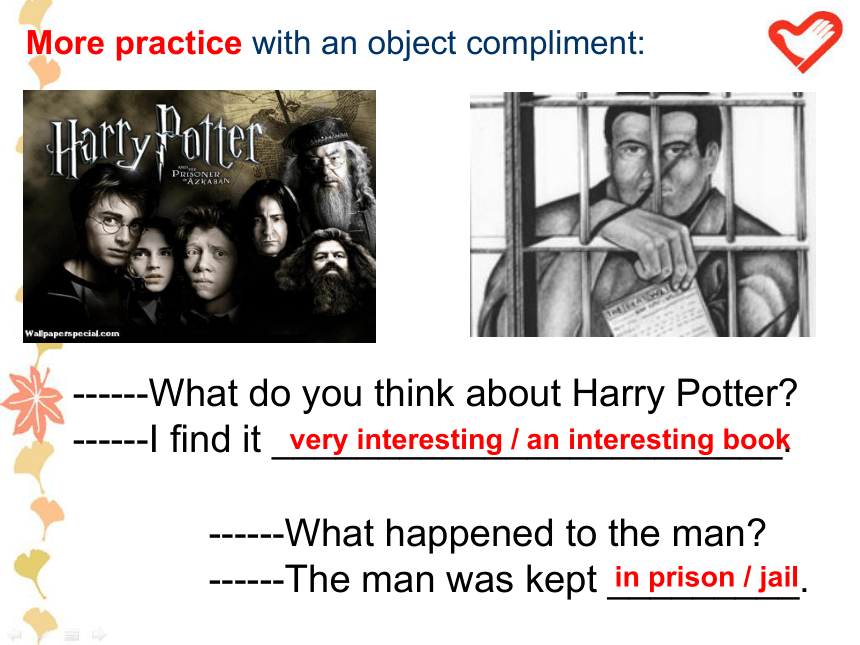
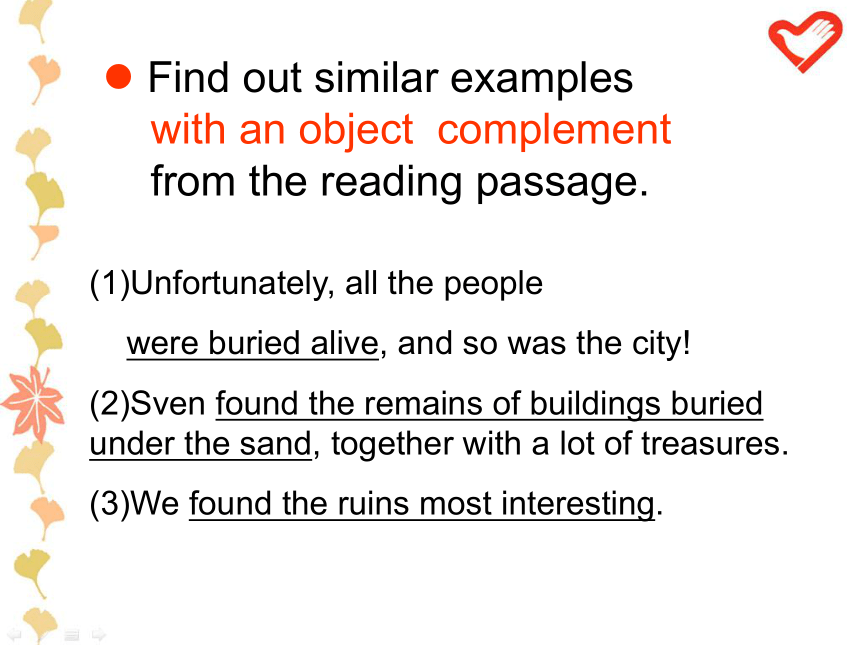
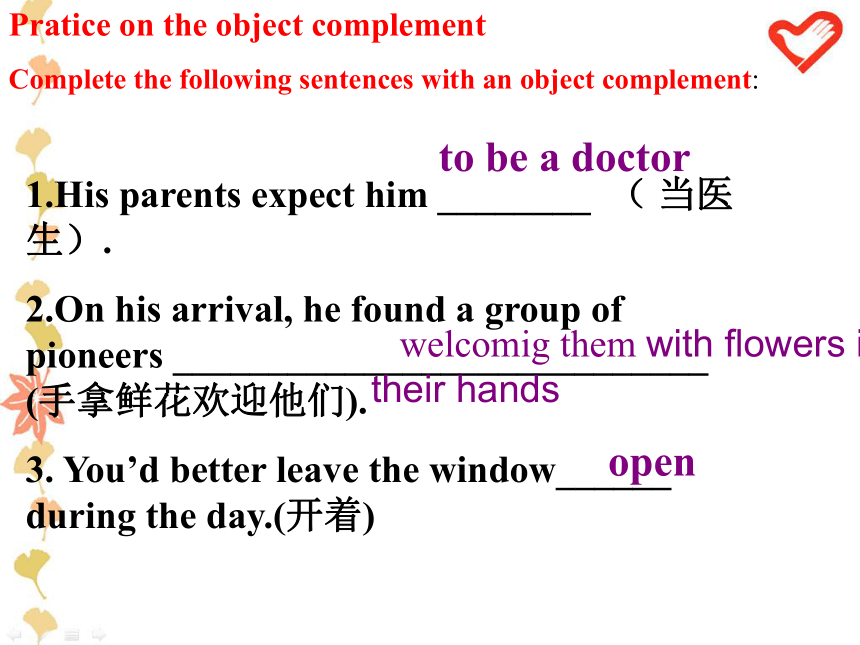
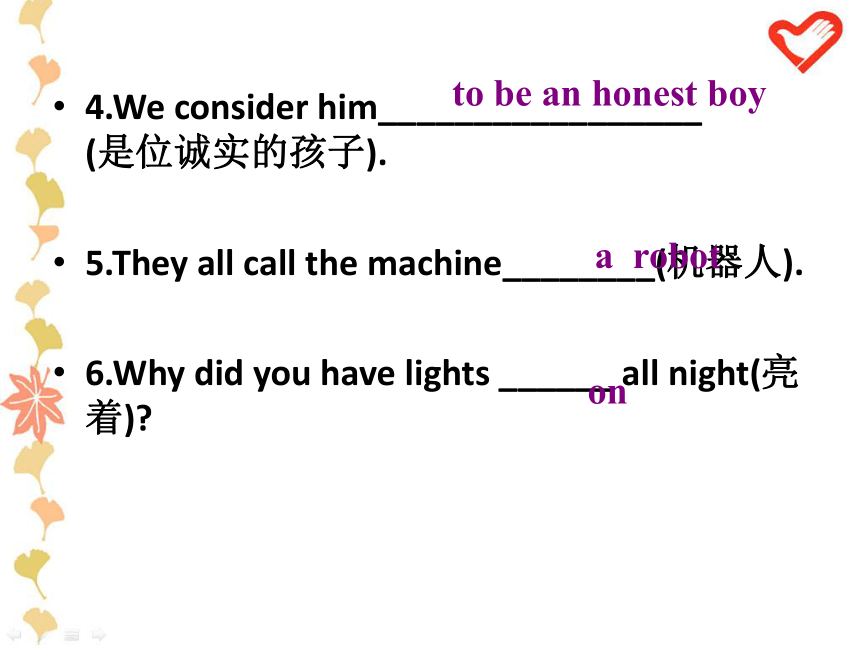
文档简介
课件30张PPT。UNIT 3BACK TO THE PASTGrammar and usage Object complementSituation one ------ Did you find anything special
when you went to the classroom?
------ No, I didn’t.
------ You found the door open, didn’t you?
------ Oh, yes. But I found nobody in the classroom. Position
V. + Object + object complement
eg: The inspector shot the drug-dealer dead.
(= The drug-deal was shot dead by the inspector.)------ What do you think about her performance?
------ We consider that her performance is a big success. ( We consider her performance a big success. )------ What do people think about dogs?
------ People believe that dogs are honest.( People believe dogs to be honest. )Situation twoUsage
An object complement ,
which gives information about the object,
can be a noun, a noun phrase, an adjective,
a to-infinitive, a bare infinitive, or a prepositional phrase. Object complement
1. A noun used as an object complement.
They called him Professor Wang.
We all made Li Hua our monitor.
2. An adjective used as object complement
The teacher asked us to leave the door open .
We find this advertisement very interesting.3.A to-infinitive can be used as an object complement
We consider him to be an honest boy.
Teachers must forbid middle school students to smoke .
4. A bare infinitive can be used an object complement.
The maths teacher had him do the exercises again.
Why did you make him stay in the classroom a bit late?
More examples with an object complement
(1) We made him chairman of our Students’ Union.
(2) I find the novel interesting and amusing.
(3) Please keep the cat out.
(4) I am often kept at home all day long on Sunday.------What do you think about Harry Potter?
------I find it ________________________.More practice with an object compliment:------What happened to the man?
------The man was kept _________.very interesting / an interesting bookin prison / jail Find out similar examples
with an object complement
from the reading passage.
(1)Unfortunately, all the people
were buried alive, and so was the city!
(2)Sven found the remains of buildings buried under the sand, together with a lot of treasures.
(3)We found the ruins most interesting.Pratice on the object complement
Complete the following sentences with an object complement:1.His parents expect him ________ ( 当医生).
2.On his arrival, he found a group of pioneers ____________________________ (手拿鲜花欢迎他们).
3. You’d better leave the window______ during the day.(开着)to be a doctor welcomig them with flowers in their hands
open4.We consider him_________________ (是位诚实的孩子).
5.They all call the machine________(机器人).
6.Why did you have lights ______ all night(亮着)?
to be an honest boya roboton Either… or and neither… nor Situation
------ I have got one ticket for Liu Xiang’s 110m
hurdle race to be held in Nanjing.
Either you or your desk-mate can have it.
------ Is it on Saturday or on Sunday?
------ It is on next Monday.
------ Oh, what a pity. I am afraid neither I nor my
desk-mate can enjoy it. Usage
(1) Either … or…
can be used to express the idea of alternatives.
e.g.: You can choose either A or B, which means you have two choices, i. e, you can choose any one of the two.(2) Neither … nor…
can be used to join two negative ideas together.
e.g.: Neither A nor B is proper in question one,
which means A is not proper, and B is not proper either. Situation one
------ Which language can I use to write the speech? ( in English / in Chinese )
Situation two
------ Whose fault is it? ( not yours / not mine )
------ You can write the speech either in English or in Chinese.------ It is neither your fault nor mine. It’s your friend Jack’s fault. More examples
(1) Either you must improve your work
or I shall dismiss you.
(2) --- Do you like reading books or watching TV?
--- Either will do.
(3) Neither John nor Tom knows how to go skiing.
(4) I tried two dresses, but neither fit me. More practice------Which one can I take, Sir?
------I am afraid, you can take
____________________.neither the gun nor the cigar------Where can I stay on Saturday night, Sir?
------You can stay ______
in the classroom _____
in the dormitory.either
or More practice Subject-verb agreementSubject-verb agreementFill in the blanks with the right verb forms:
1.The People’s Republic of China _____(be) founded in 1949.
2.The food they offered on the plane ____(be) delicious.
waswas3.Two hours _____ (be) not enough for so much homework.
4.Twenty thousand dollars_____(be) a large amount of money to me.
The verb should be singular if the subject is a phrase of measurement, money or distance.isisAll of us _______ ( attend) the lecture about Pompeii .
Most of the lecture ______(be) about how the ancient city was discovered.
I spent only 30 yuan buying books and the rest of money_______(be) spent on my food.When the subject is all of/ some of /half of+noun/pronoun, the verb agrees with the noun and pronoun.have attendedwaswasAn expert with some assistants_____ (be) sent to work in Gansu Province.
No one except two teachers________( know) the secret.
Xiao Ming as well as his parents_____(be) interested in music.
.wasknowsisWhen the subject followed by with/
together with/as well as/,
the verb agrees with the subjectEither the team leader or the guides _____ (be) looking after the students.
Neither noodles nor rice______(be) delicious today.
Either you or the headmaster_______(be) to hand out prizes to those gifted students at the meeting.
Not only you but also I_______(be) puzzled at her worried look.areiswasamWhen neither…nor/ either…or/ not only…
but also… are used to join the subjects of
a sentence, the verb agrees with the
subject closest to it.His family_____(be ) to move to the countryside next month.
His family _____all (be) fond of popular music.
Our school ______(be) a key school in Jiangsu Province.
Our school ______doing (do) morning exercises now on the playground.
.isareisareWhen the subject is a group nouns like:
class/ family/ government/ team… ,
we use a singular verb if the noun identifies
a singular or unit, or a plural verb if it identifies
a number of individuals Exercise one: Multiple choice:
About eighty percent of the students in his class ______ below sixteen.
A. is B. are C. am D. be
2. There ______ a map of the world
and some pictures on the wall.
A. is B. are C. am D. be
3. A large quantity of water pipes
______ needed.
A. are B. is C. has D. haveB A B 4. How and why he ______ come to Princeton,
New Jersey ______ a story of struggle,
success and sadness.
A. had…was B. had… are
C. had… has D. had… have
5. Nobody but Jane and Mary ______ the secret.
A. know B. knows
C. have known D. is knownA B Exercise two: Fill in the blanks with the right form of the given verbs:
(1) ______ (have) your classmates finished their homework?
(2) My friend and I _____ (want) to play outside after watching TV.
(3) Most of the students _____ (prefer) English to Mathematics.
(4) ___________ (have) all of the cake been eaten up?
(5) Collecting stamps _____ (be) one of his favorite pastimes.Have wantpreferHave / has is(6) _____ (be) your family a big one?
(7) All my family _____ (get) up early in the morning.
(8) Neither his father nor his mother ______ (play) the piano.
(9) The remains of the old castle _____ (be) destroyed in World War Two.
(10) Not only Jim but also his Parents _____ (be) going to see you next Sunday.
Is getplayswereare Homework
1. Finish off the exercise on P48.
2. Finish off the exercise on P49.
3. Finish off the exercise on P51.
when you went to the classroom?
------ No, I didn’t.
------ You found the door open, didn’t you?
------ Oh, yes. But I found nobody in the classroom. Position
V. + Object + object complement
eg: The inspector shot the drug-dealer dead.
(= The drug-deal was shot dead by the inspector.)------ What do you think about her performance?
------ We consider that her performance is a big success. ( We consider her performance a big success. )------ What do people think about dogs?
------ People believe that dogs are honest.( People believe dogs to be honest. )Situation twoUsage
An object complement ,
which gives information about the object,
can be a noun, a noun phrase, an adjective,
a to-infinitive, a bare infinitive, or a prepositional phrase. Object complement
1. A noun used as an object complement.
They called him Professor Wang.
We all made Li Hua our monitor.
2. An adjective used as object complement
The teacher asked us to leave the door open .
We find this advertisement very interesting.3.A to-infinitive can be used as an object complement
We consider him to be an honest boy.
Teachers must forbid middle school students to smoke .
4. A bare infinitive can be used an object complement.
The maths teacher had him do the exercises again.
Why did you make him stay in the classroom a bit late?
More examples with an object complement
(1) We made him chairman of our Students’ Union.
(2) I find the novel interesting and amusing.
(3) Please keep the cat out.
(4) I am often kept at home all day long on Sunday.------What do you think about Harry Potter?
------I find it ________________________.More practice with an object compliment:------What happened to the man?
------The man was kept _________.very interesting / an interesting bookin prison / jail Find out similar examples
with an object complement
from the reading passage.
(1)Unfortunately, all the people
were buried alive, and so was the city!
(2)Sven found the remains of buildings buried under the sand, together with a lot of treasures.
(3)We found the ruins most interesting.Pratice on the object complement
Complete the following sentences with an object complement:1.His parents expect him ________ ( 当医生).
2.On his arrival, he found a group of pioneers ____________________________ (手拿鲜花欢迎他们).
3. You’d better leave the window______ during the day.(开着)to be a doctor welcomig them with flowers in their hands
open4.We consider him_________________ (是位诚实的孩子).
5.They all call the machine________(机器人).
6.Why did you have lights ______ all night(亮着)?
to be an honest boya roboton Either… or and neither… nor Situation
------ I have got one ticket for Liu Xiang’s 110m
hurdle race to be held in Nanjing.
Either you or your desk-mate can have it.
------ Is it on Saturday or on Sunday?
------ It is on next Monday.
------ Oh, what a pity. I am afraid neither I nor my
desk-mate can enjoy it. Usage
(1) Either … or…
can be used to express the idea of alternatives.
e.g.: You can choose either A or B, which means you have two choices, i. e, you can choose any one of the two.(2) Neither … nor…
can be used to join two negative ideas together.
e.g.: Neither A nor B is proper in question one,
which means A is not proper, and B is not proper either. Situation one
------ Which language can I use to write the speech? ( in English / in Chinese )
Situation two
------ Whose fault is it? ( not yours / not mine )
------ You can write the speech either in English or in Chinese.------ It is neither your fault nor mine. It’s your friend Jack’s fault. More examples
(1) Either you must improve your work
or I shall dismiss you.
(2) --- Do you like reading books or watching TV?
--- Either will do.
(3) Neither John nor Tom knows how to go skiing.
(4) I tried two dresses, but neither fit me. More practice------Which one can I take, Sir?
------I am afraid, you can take
____________________.neither the gun nor the cigar------Where can I stay on Saturday night, Sir?
------You can stay ______
in the classroom _____
in the dormitory.either
or More practice Subject-verb agreementSubject-verb agreementFill in the blanks with the right verb forms:
1.The People’s Republic of China _____(be) founded in 1949.
2.The food they offered on the plane ____(be) delicious.
waswas3.Two hours _____ (be) not enough for so much homework.
4.Twenty thousand dollars_____(be) a large amount of money to me.
The verb should be singular if the subject is a phrase of measurement, money or distance.isisAll of us _______ ( attend) the lecture about Pompeii .
Most of the lecture ______(be) about how the ancient city was discovered.
I spent only 30 yuan buying books and the rest of money_______(be) spent on my food.When the subject is all of/ some of /half of+noun/pronoun, the verb agrees with the noun and pronoun.have attendedwaswasAn expert with some assistants_____ (be) sent to work in Gansu Province.
No one except two teachers________( know) the secret.
Xiao Ming as well as his parents_____(be) interested in music.
.wasknowsisWhen the subject followed by with/
together with/as well as/,
the verb agrees with the subjectEither the team leader or the guides _____ (be) looking after the students.
Neither noodles nor rice______(be) delicious today.
Either you or the headmaster_______(be) to hand out prizes to those gifted students at the meeting.
Not only you but also I_______(be) puzzled at her worried look.areiswasamWhen neither…nor/ either…or/ not only…
but also… are used to join the subjects of
a sentence, the verb agrees with the
subject closest to it.His family_____(be ) to move to the countryside next month.
His family _____all (be) fond of popular music.
Our school ______(be) a key school in Jiangsu Province.
Our school ______doing (do) morning exercises now on the playground.
.isareisareWhen the subject is a group nouns like:
class/ family/ government/ team… ,
we use a singular verb if the noun identifies
a singular or unit, or a plural verb if it identifies
a number of individuals Exercise one: Multiple choice:
About eighty percent of the students in his class ______ below sixteen.
A. is B. are C. am D. be
2. There ______ a map of the world
and some pictures on the wall.
A. is B. are C. am D. be
3. A large quantity of water pipes
______ needed.
A. are B. is C. has D. haveB A B 4. How and why he ______ come to Princeton,
New Jersey ______ a story of struggle,
success and sadness.
A. had…was B. had… are
C. had… has D. had… have
5. Nobody but Jane and Mary ______ the secret.
A. know B. knows
C. have known D. is knownA B Exercise two: Fill in the blanks with the right form of the given verbs:
(1) ______ (have) your classmates finished their homework?
(2) My friend and I _____ (want) to play outside after watching TV.
(3) Most of the students _____ (prefer) English to Mathematics.
(4) ___________ (have) all of the cake been eaten up?
(5) Collecting stamps _____ (be) one of his favorite pastimes.Have wantpreferHave / has is(6) _____ (be) your family a big one?
(7) All my family _____ (get) up early in the morning.
(8) Neither his father nor his mother ______ (play) the piano.
(9) The remains of the old castle _____ (be) destroyed in World War Two.
(10) Not only Jim but also his Parents _____ (be) going to see you next Sunday.
Is getplayswereare Homework
1. Finish off the exercise on P48.
2. Finish off the exercise on P49.
3. Finish off the exercise on P51.
